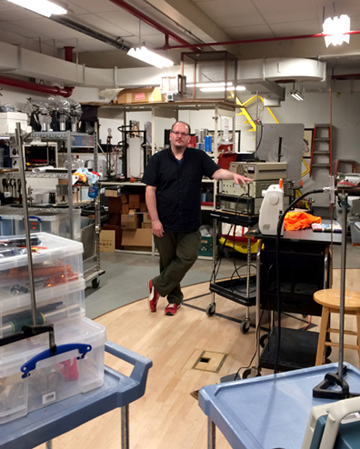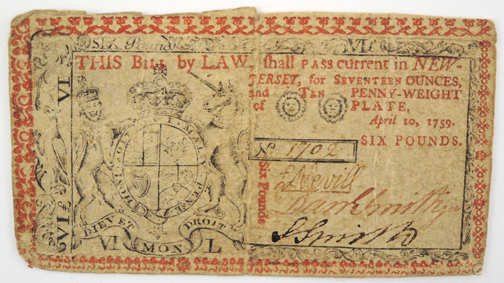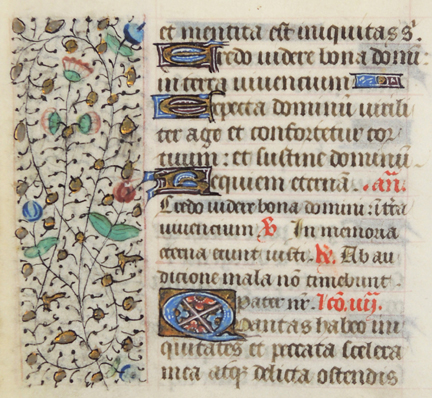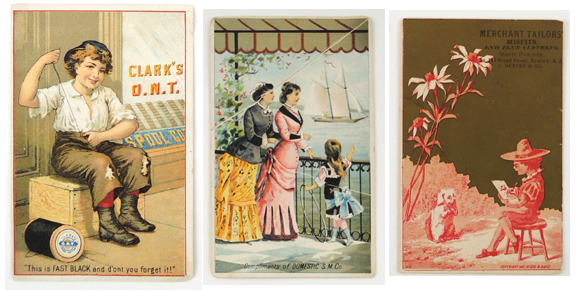 We always love explosions here at Pop Goes the Page, but today we are going to bring you something truly unique…today, we are going to show you words as fire. Yes, FIRE!
We always love explosions here at Pop Goes the Page, but today we are going to bring you something truly unique…today, we are going to show you words as fire. Yes, FIRE!
This remarkable demonstration would not be possible without two things: 1) A Ruben’s tube, and 2) Princeton University’s Manager of Undergraduate Labs and Demonstrations, Mr. Omelan Stryzak. There’s an interview with Omelan at the end of the post, but for now, let’s get to the FIRE!
A Ruben’s tube, which was invented by German physicist Heinrich Ruben’s in 1905, is a length of tube with perforations along the top. One end of the tube is attached to a flammable gas, and the other end to a small speaker or frequency generator. Send the gas flowing through the pipe, ignite where it escapes through the perforations, and then introduce sound through the speaker. The flames will oscillate higher and lower according to the pitch of the sound or song.
Here’s “Flight of the Bumblebee,” played through the Ruben’s tube:
Of course, being the literary fans we are, we wanted to see what happens when we read into the Ruben’s tube. Wouldn’t it be cool to see words as FIRE? The short answer is yes. It is waaaaay cool to see words as fire. Here’s Jabberwocky by Lewis Carroll. Please note: I recited it all weird to get the pitch of my voice in different places.
This awesome demo was masterminded by Omelan Stryzak, Princeton University Department of Physics. Here he is, photographed in his office/magical science playground.
 And we do mean magical because look at this! An actual levitating object, just casually sitting on the edge of his desk!
And we do mean magical because look at this! An actual levitating object, just casually sitting on the edge of his desk!
Also! A secret moving wall…which technically allows equipment from Omelan’s office to be smoothly transported to the adjoining auditorium. But we couldn’t resist a turn on it.
There are a number of other way cool objects in Omelan’s realm, from plasma balls, to portraits of Archimedes, to machines that break wineglasses with excruciatingly high tones!
 Omelan hails from Bridgewater, New Jersey, where, as a home schooled youth, he continually curb shopped for thrown out electronics (photocopiers, fax machines, etc.) to disassemble and learn from. Graduating college with a degree in Electrical and Computer Engineering, he has worked for Disney, traveled the world, and adopted a stray kitten who he aptly named “Fizzix.” He’s also a father with a young son, and self-admits a newfound skill of telling “absolutely terrible Dad jokes.”
Omelan hails from Bridgewater, New Jersey, where, as a home schooled youth, he continually curb shopped for thrown out electronics (photocopiers, fax machines, etc.) to disassemble and learn from. Graduating college with a degree in Electrical and Computer Engineering, he has worked for Disney, traveled the world, and adopted a stray kitten who he aptly named “Fizzix.” He’s also a father with a young son, and self-admits a newfound skill of telling “absolutely terrible Dad jokes.”
How did you land this incredibly cool job?
I had come back to NJ from an IT job in Miami and was teaching for the “Mad Science” franchise as a break and I received a call from Princeton…apparently the Physics Department picked out my resume because I had experience with small mechanical devices and electronics (I had learned early on – ALWAYS keep your resume in circulation… you never know who might reach out…). They wanted someone to build the sensor head to the ACT (Atacama Cosmology Telescope) and I could not pass up the opportunity to add the Princeton logo to my resume…
I spent time in the cleanroom assembling parts at the heart of the telescope that were only millimeters in size and making giant cables as wide as my wrist…I even spent a few months working at the telescope in Chile on the Atacama Plateau (at the time it was the highest continuously manned telescope in the world – and it was looking for/at the beginning of the Universe!). As this very cool project was winding down, two elderly gentlemen who were doing the job I have now were retiring – I was a pretty good fit and decided to take the job. Long story short, I kind of fell into this job.
What’s your philosophy on science education?
I wish everyone were gifted with at least a little interest in science and the opportunity to explore: Applied right, it is like having an additional sense or x-ray vision applicable to every-day life. With that said, science will become increasingly more important for future generations of children and their increasingly difficult problems to solve. It should also be more of a communal education/understanding for all – fewer revered specialists or individuals to blindly follow and rely on to make critical mistakes. My part in this? I’ve always described by job as “Bringing the boring science book to life – showing concepts in the real world to aid understanding and entertain at the same time.”
Describe a typical work day:
Its definitely changed a lot with a 13 month old… ^_^
- Wife wakes me up just before 6am as she leaves to go teach high-school….. out the door by 7:30am at the latest.
- My Wife’s brother takes care of our Son during the day. Never thought we’d have a “manny”. ^_^
- If the weather is good, take the bike off the back of my car and bike from the parking lot to my office.
- Prep any last minute demo requests – Professors love to have ideas around midnight/1am and send me an email.
- Deliver any specially requested demos to the smaller classrooms for precepts (different sections of classes where class size is smaller and students get more one-on-one time with Professors and demos)
- Make sure the demos pulled the previous day are ready for Professorial review (basically lecture rehearsal and getting the profs familiar with the equipment – Usually I have to remind/chase down a few Professors to remind them that they need to come down to look at their demos…. Or even remind them that we have demos to reinforce a particular topic that they are teaching)
- Make any requested modifications/create new demos that are relevant to the upcoming classes. (I’ve got carte blanche and training on all the Department’s resources – all of the machine shops (including the machines that can kill you!), stock room, laser cutter, departmental credit card…. Ohh the possibilities)
- Setup the demos on-stage the day’s lecture(s) while being careful of scheduling (the two large lecture halls are multi-purpose – Physics classes are not the only users)
- Run the lecture with the Professor – depending on who is lecturing my interaction can change… sometimes I’m sitting on the sidelines just in case something goes wrong, other times I’m the one describing the science and running the apparatus while the Professor waits/watches.
- Once the lecture is over, hang around the classroom if I can for curious students who want to learn more or have trouble understanding the demo(s). Very rewarding. ^_^
- Break everything down and return it to backstage for cleanup/storage.
- Pull relevant demos from inventory for the coming three days for cleaning/refurbishment/lecture prep.
- If we recorded the lecture, either edit and upload the video myself or offload the workload to a coworker.
- If I’m home first, cook dinner and snuggle with our Son.
- Once baby bedtime is over, a good hour on the computer is spent on emails, making technical drawings, writing code or paying bills. Surprisingly, I don’t participate with any social networking (Facebook, etc..) saves a lot of time!
- Then the typical chores/cleaning/home maintenance before bed.
What’s your favorite science toy in the workshop?
Always a tough question! But I really do like the reactions that I get from the singing Tesla coil exploding a balloon hydrogen filled balloon….. and EVERYONE hates it when I make it sing “Let it Go”. ^_^
Wasn’t sure if I was going to include this in the post, but since Omelan DID mention singing…here’s Katie with her rendition of “You Are My Sunshine,” courtesy of sulfur hexafluoride:
SF6 is an inert, nontoxic and incombustible gas, but…DON’T TRY THIS AT HOME KIDS!






 We always love
We always love  And we do mean magical because look at this! An actual levitating object, just casually sitting on the edge of his desk!
And we do mean magical because look at this! An actual levitating object, just casually sitting on the edge of his desk! Omelan hails from Bridgewater, New Jersey, where, as a home schooled youth, he continually curb shopped for thrown out electronics (photocopiers, fax machines, etc.) to disassemble and learn from. Graduating college with a degree in Electrical and Computer Engineering, he has worked for Disney, traveled the world, and adopted a stray kitten who he aptly named “Fizzix.” He’s also a father with a young son, and self-admits a newfound skill of telling “absolutely terrible Dad jokes.”
Omelan hails from Bridgewater, New Jersey, where, as a home schooled youth, he continually curb shopped for thrown out electronics (photocopiers, fax machines, etc.) to disassemble and learn from. Graduating college with a degree in Electrical and Computer Engineering, he has worked for Disney, traveled the world, and adopted a stray kitten who he aptly named “Fizzix.” He’s also a father with a young son, and self-admits a newfound skill of telling “absolutely terrible Dad jokes.”